In St Augustine's Westbury we have memorials inside the church to the fallen in World War 1 who are linked to the village
In addiition, one of the fallen, Reuben Horwood is burried in the churchyard itself
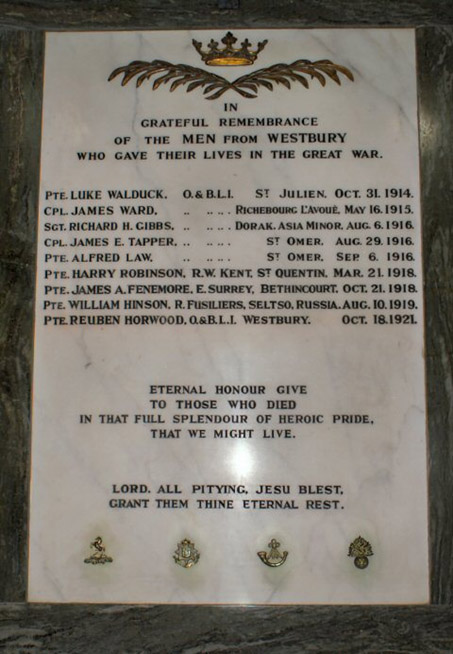
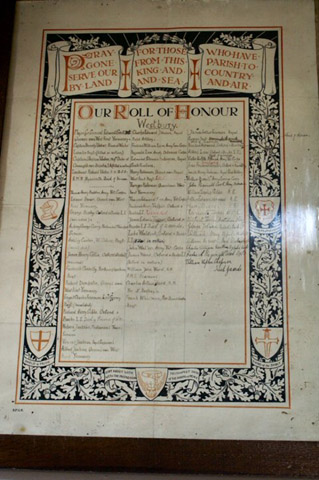
Outside we have the war memorial where we read the roll of honour each Remembrance service each November
If you live in the village, you would be very welcome to join the annual village act of remembrance where the names of the fallen are read out folowed by the two minute silence
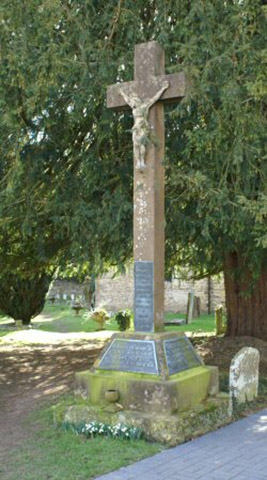
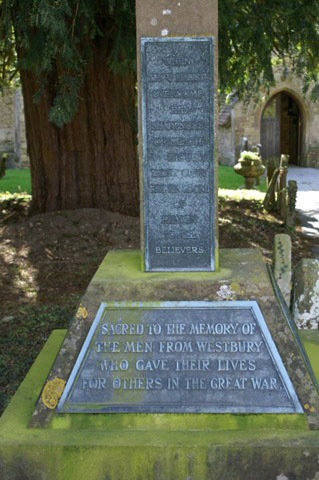
These are stories behind some of those linked to Westbury who fell in First World war and also of the Ussher family:
Luke Walduck
James Ward
Richard Harry Gibbs
James Edwin Tapper
Alfred Law
Harry Robinson
James Arthur Fenemore
William Hinson
Reuben Horwood
The Ussher Family
Stephen Ussher
Beverely Ussher
Richard Ussher
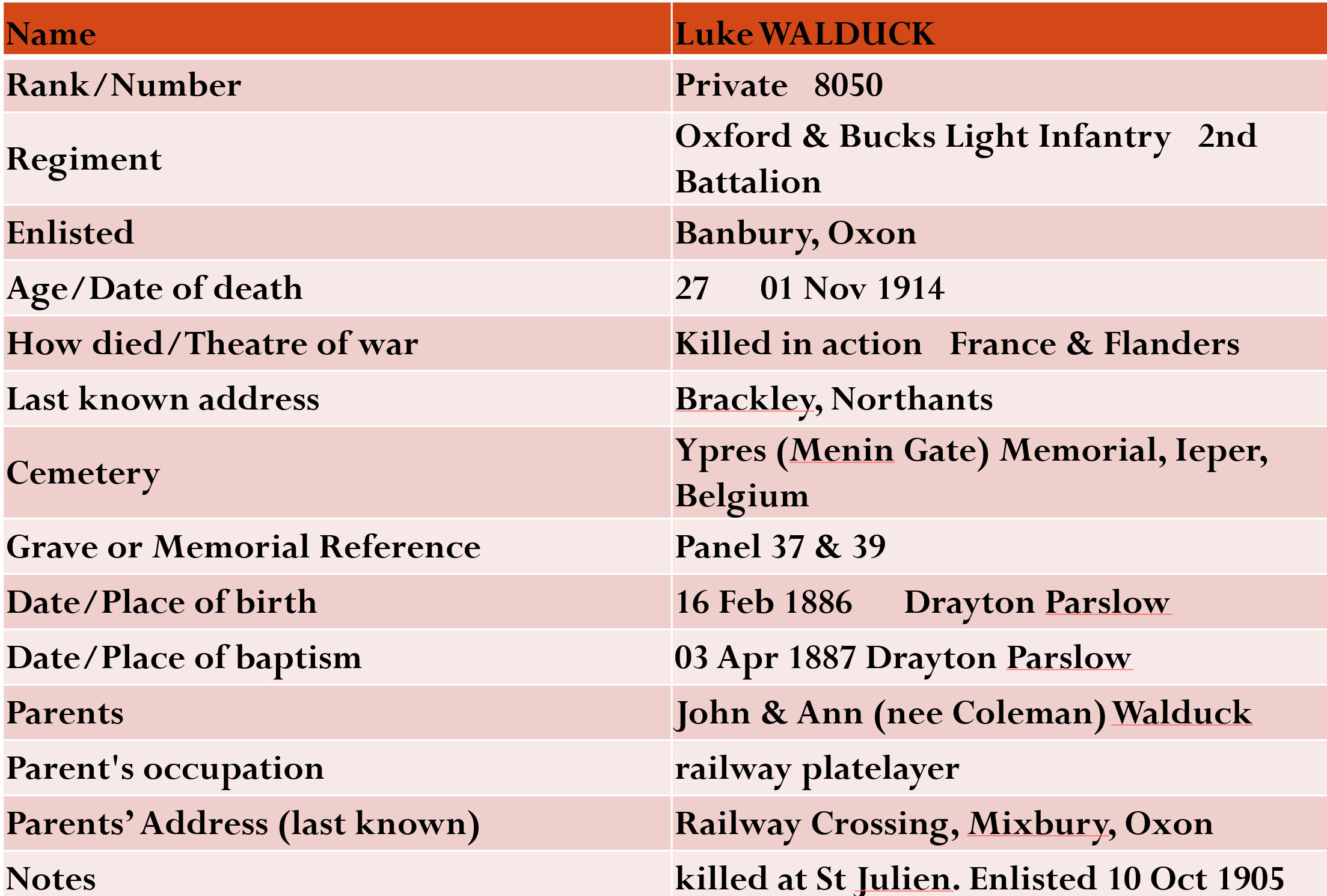
The 1914 Star was instituted in 1917 for service ashore in France and Flanders between 5 August and 22 November 1914. In 1919 a clasp bearing the above dates was authorised and given to those individuals who had actually been under fire between the prescribed dates, popularly known as the 'Mons star' there were 378,000 awarded in total
The 1914/15 Star was instituted in 1918 and awarded to those individuals who saw service in France and Flanders from 23 November 1914 to 31 December 1915, and to those individuals who saw service in any other operational theatre from 5 August 1914 to 31 December 1915
Given the information we have available it is likely that Luke Walduck was entitled to the Victory medal, also called the Inter Allied Victory Medal. This medal was awarded to all who received the 1914 Star or 1914-15 Star and, with certain exceptions, to those who received the British War Medal. It was never awarded alone. These three medals were sometimes irreverently referred to as Pip, Squeak and Wilfred
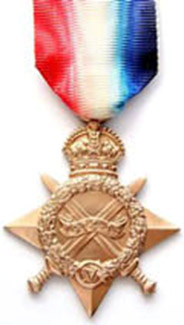
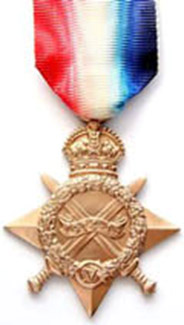
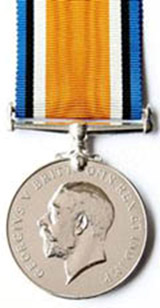
Luke is remembered on the Menin Gate memorial in Belgium
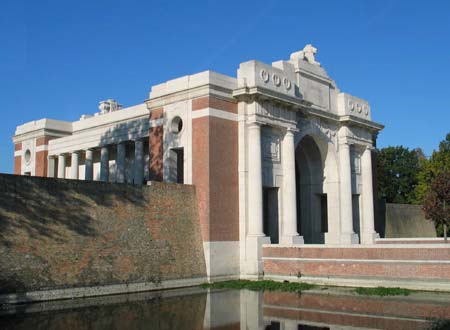
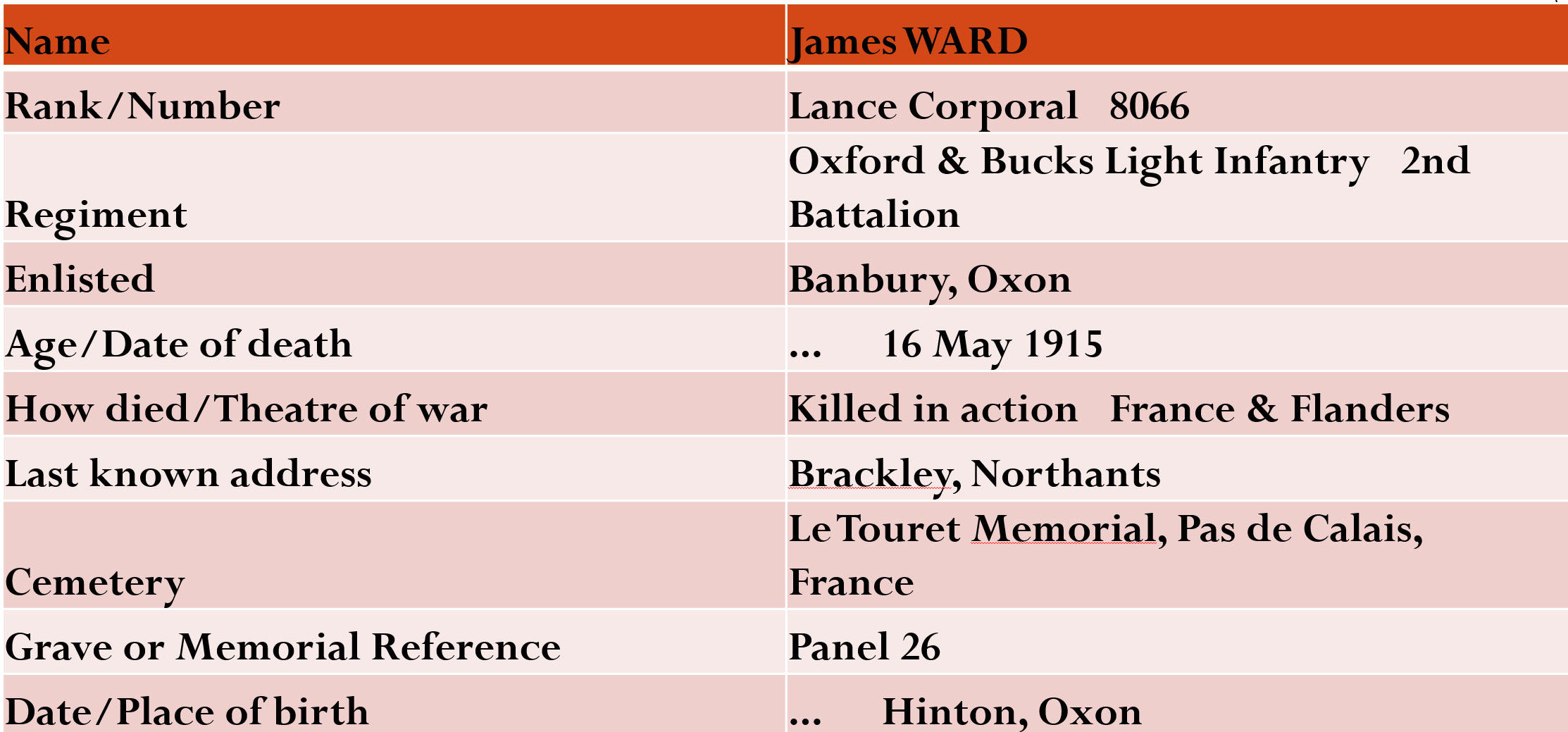
James is burried at the Le Touret Memorial in France
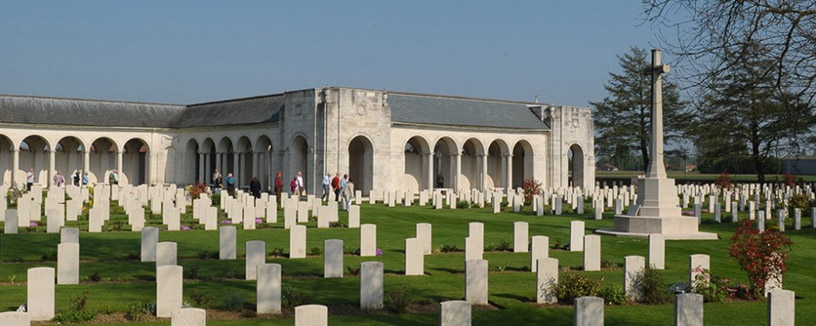
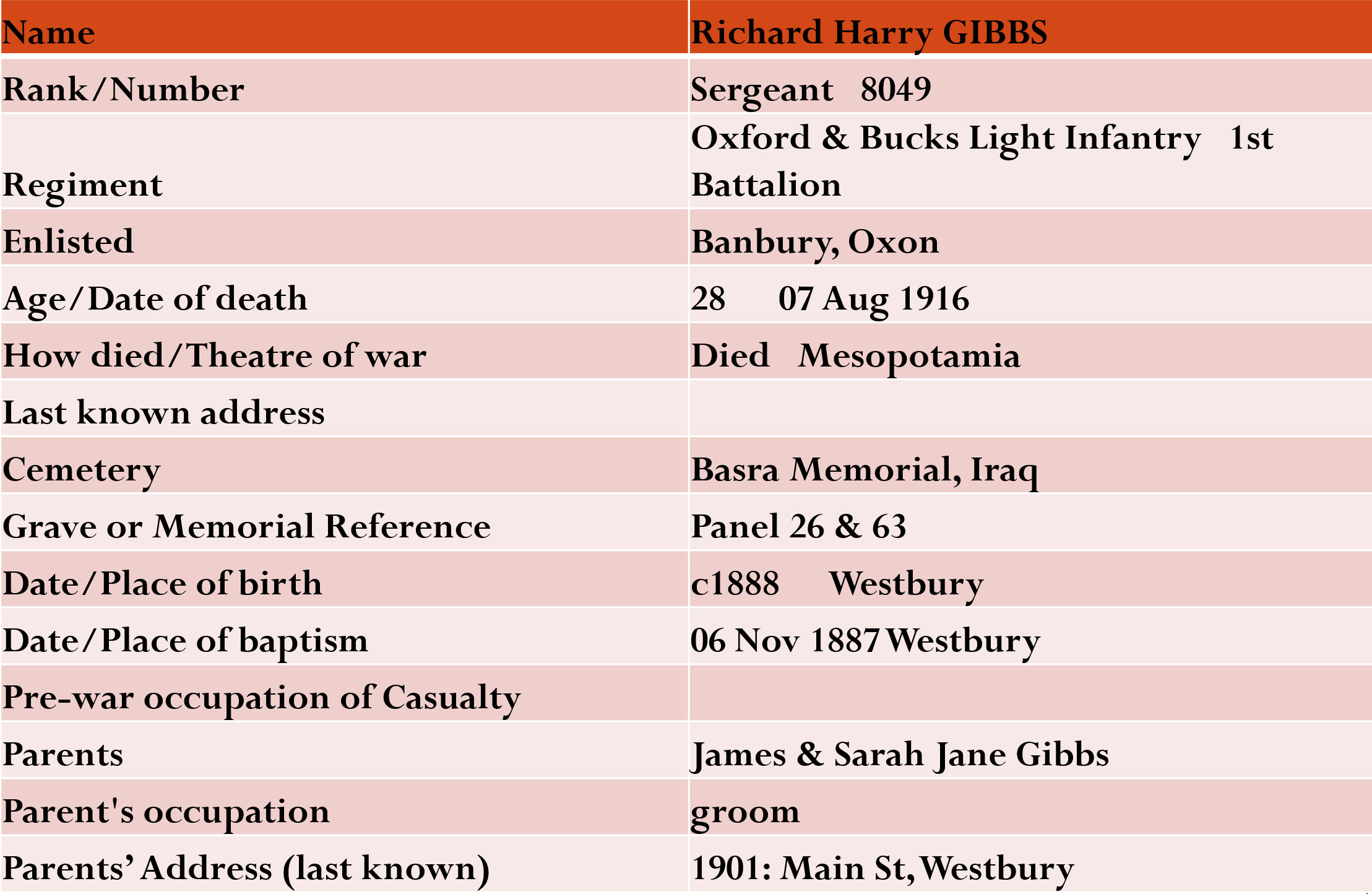
Richard Gibbs died as a prisoner of war in Dorak in modern day Iraq
He has no grave but is commemorated in this memorial
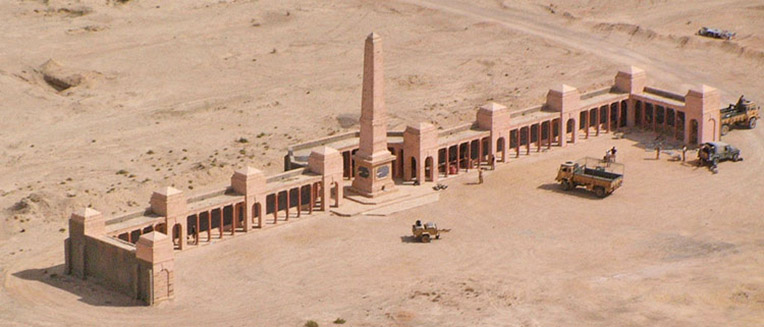
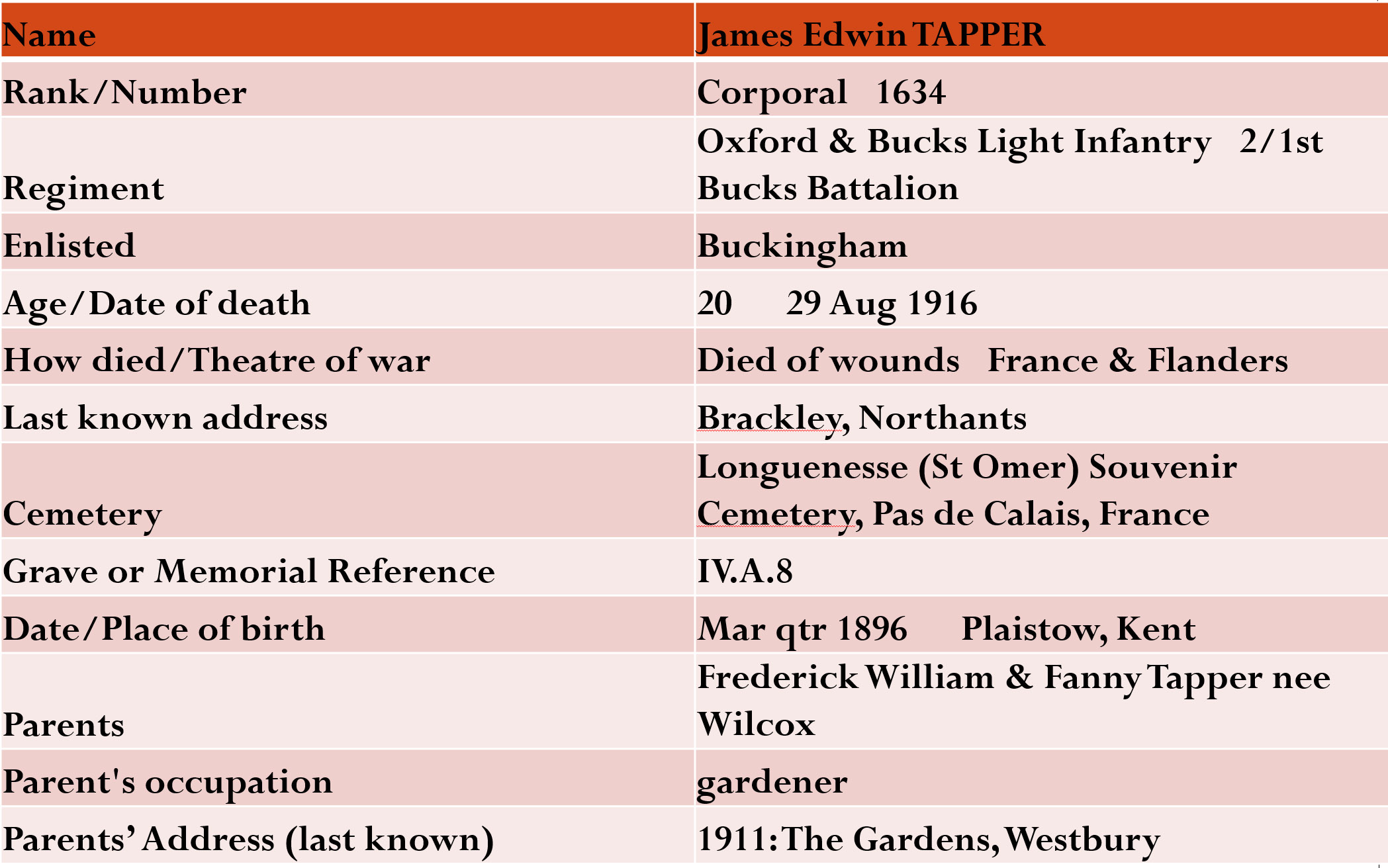
James Tapper is burried in one of these graves here on the right of the path
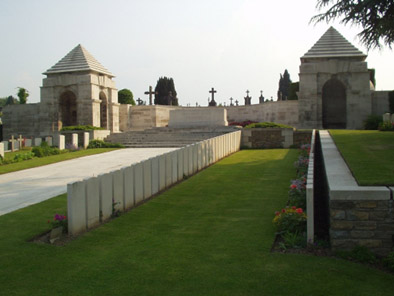
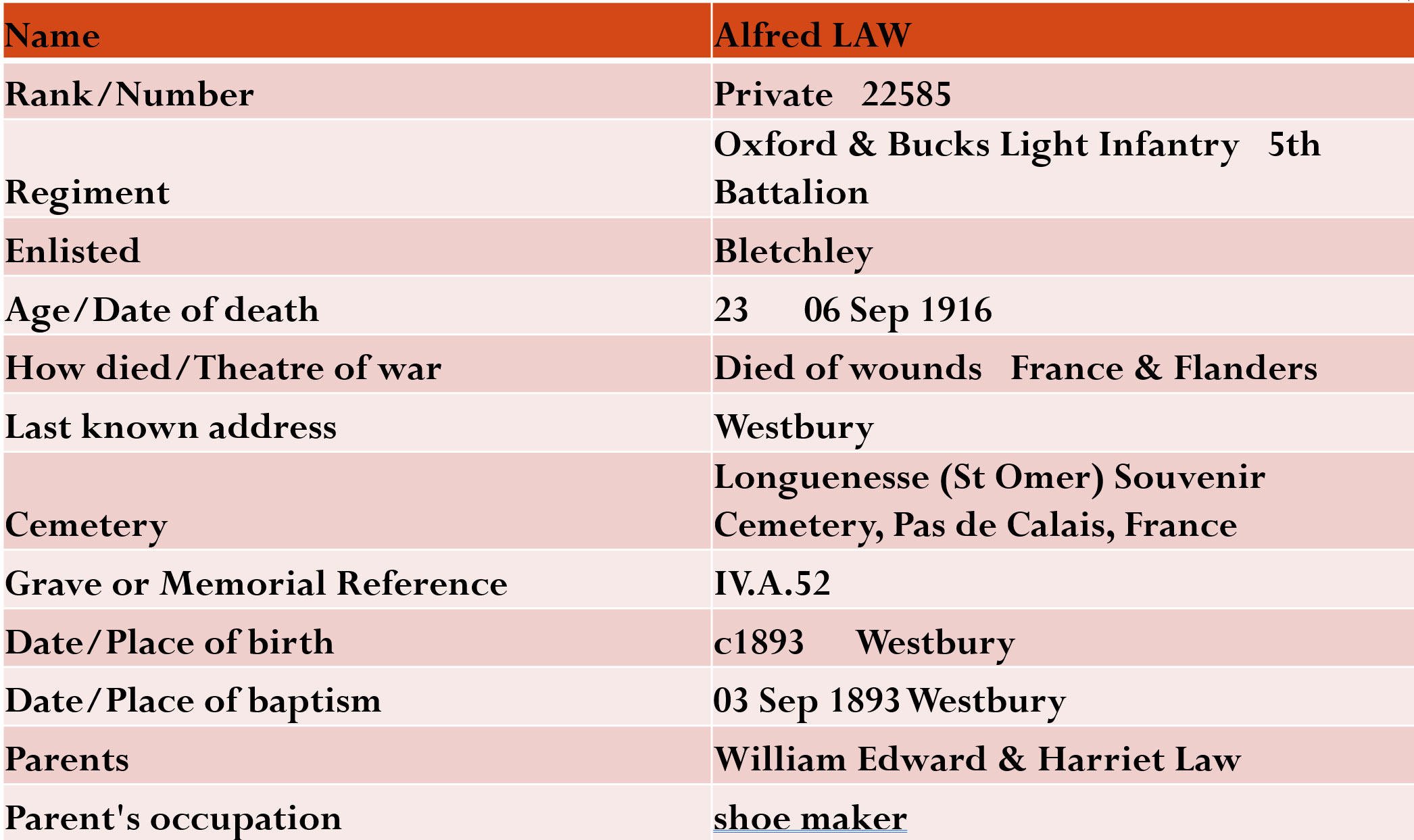
Alfred Law is burried in Longuenesse Cemetery in France
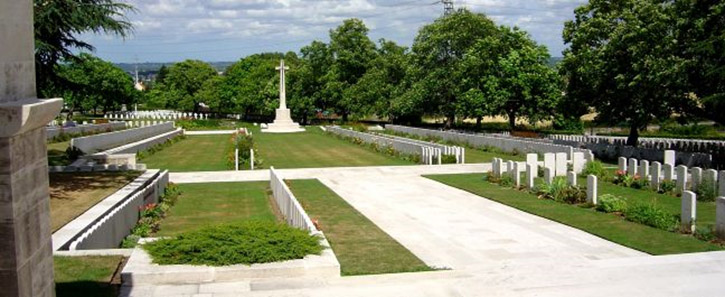
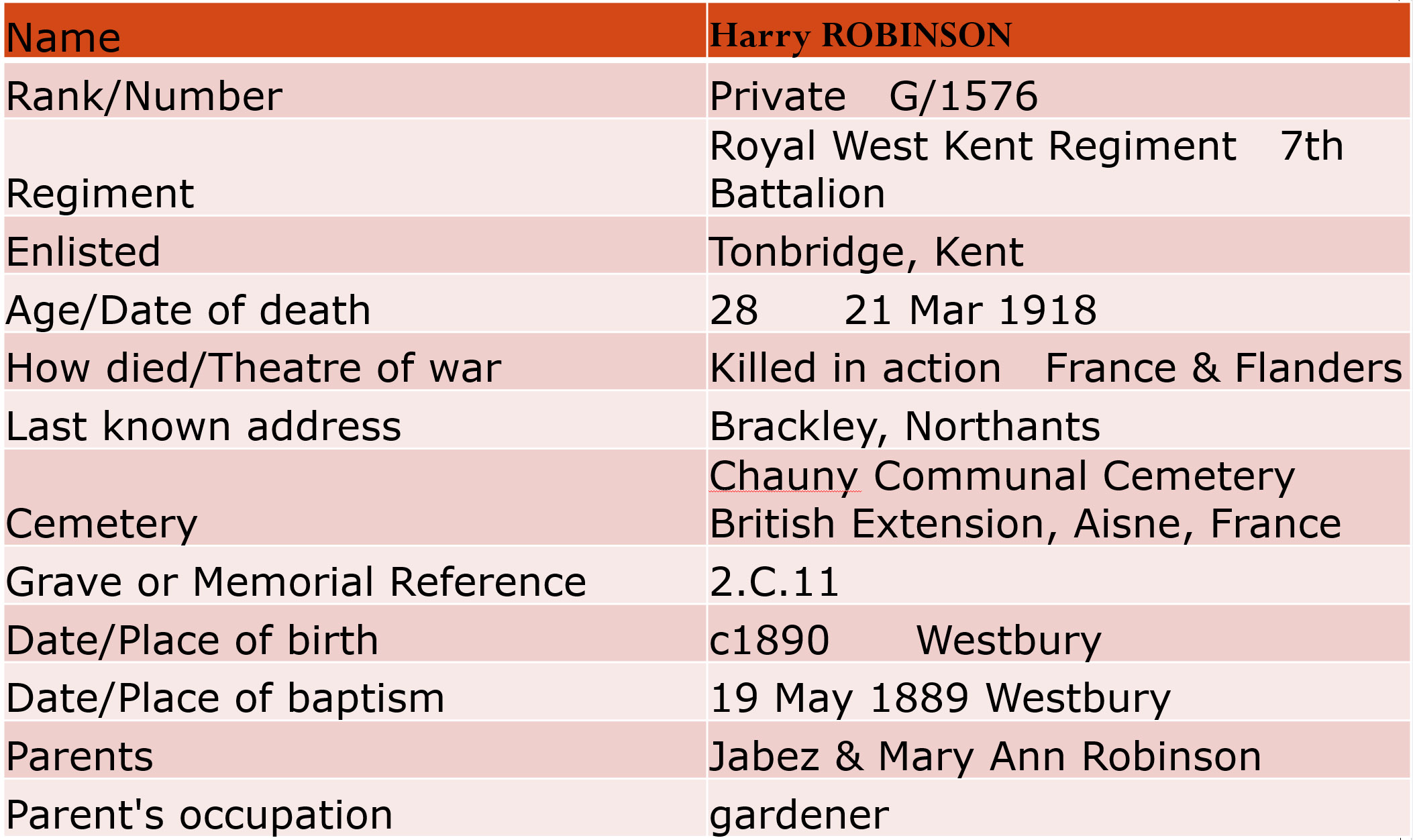
Harry Robinson is burried in one of the graves in the right of the pictures but his battlefield cross is in the church
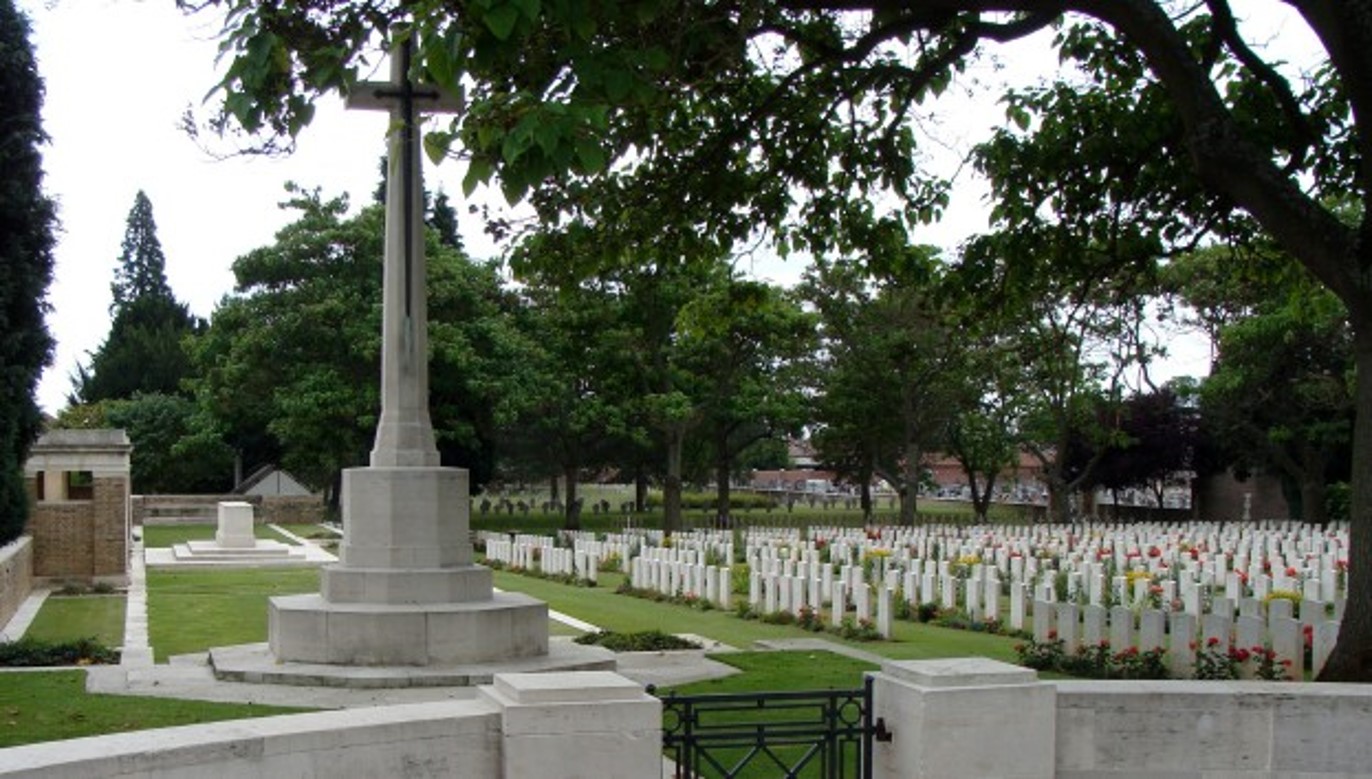
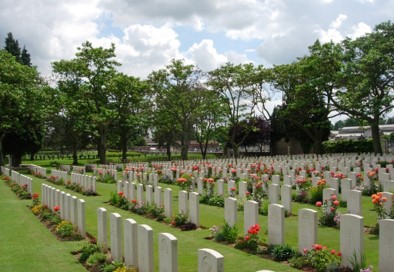
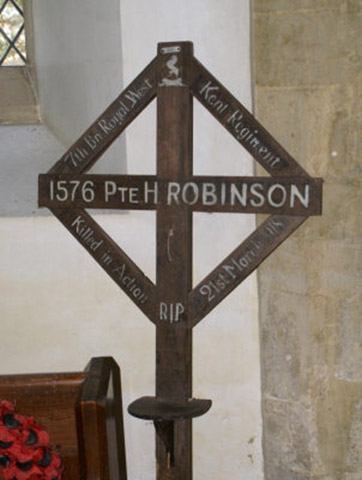
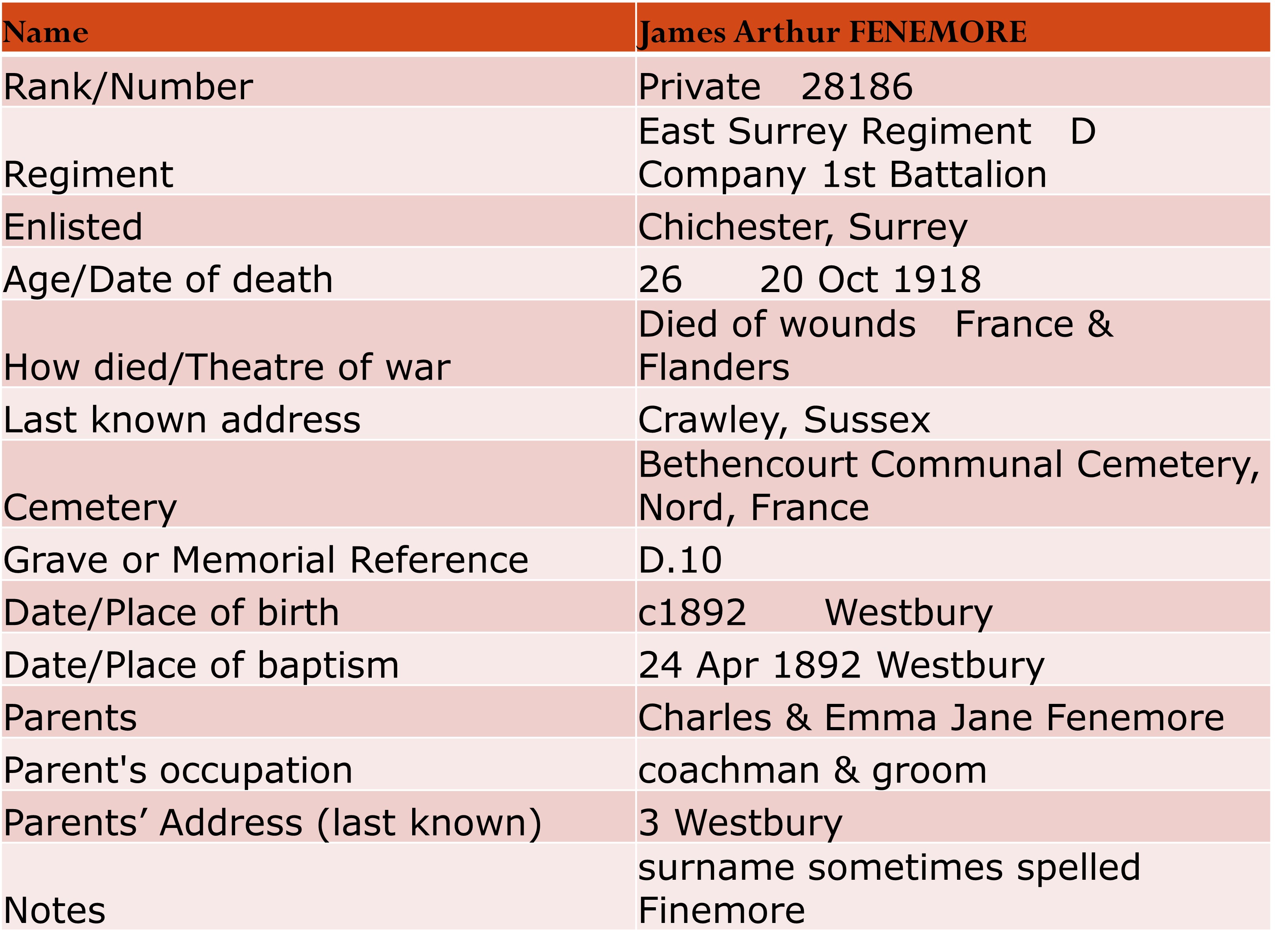
James Fenemore is burried in Bethencourt Communal Cemetery in France but his battlefield cross is in the church
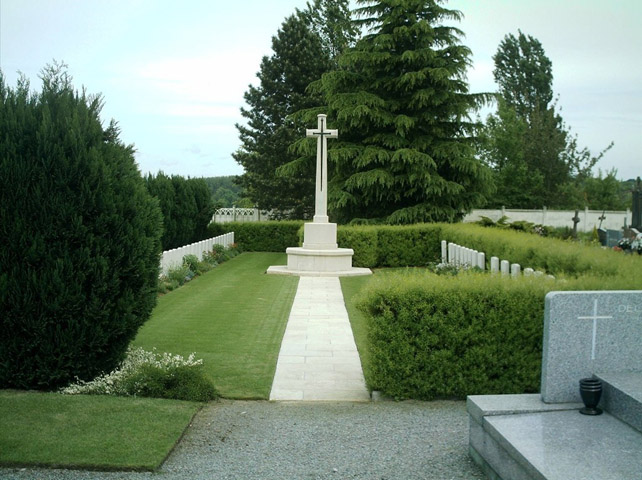
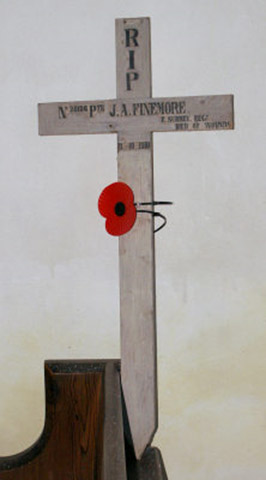
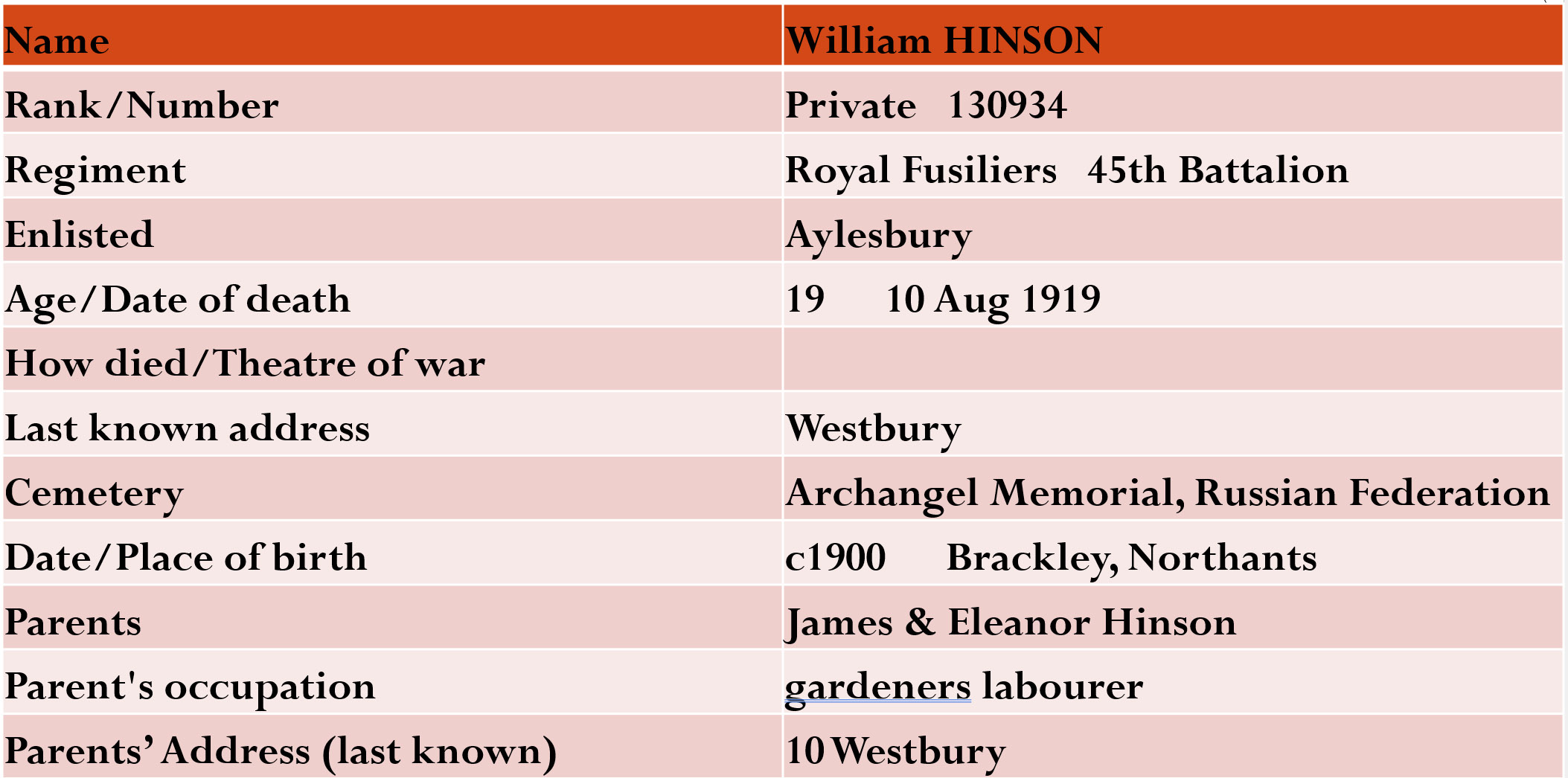
WIlliam Hinson is burried in Russia
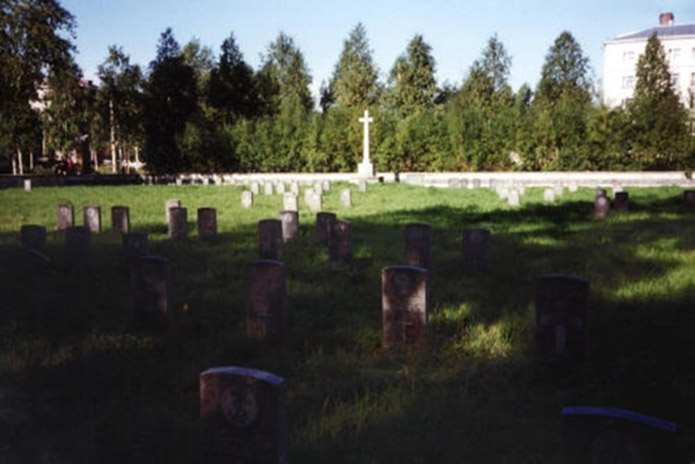
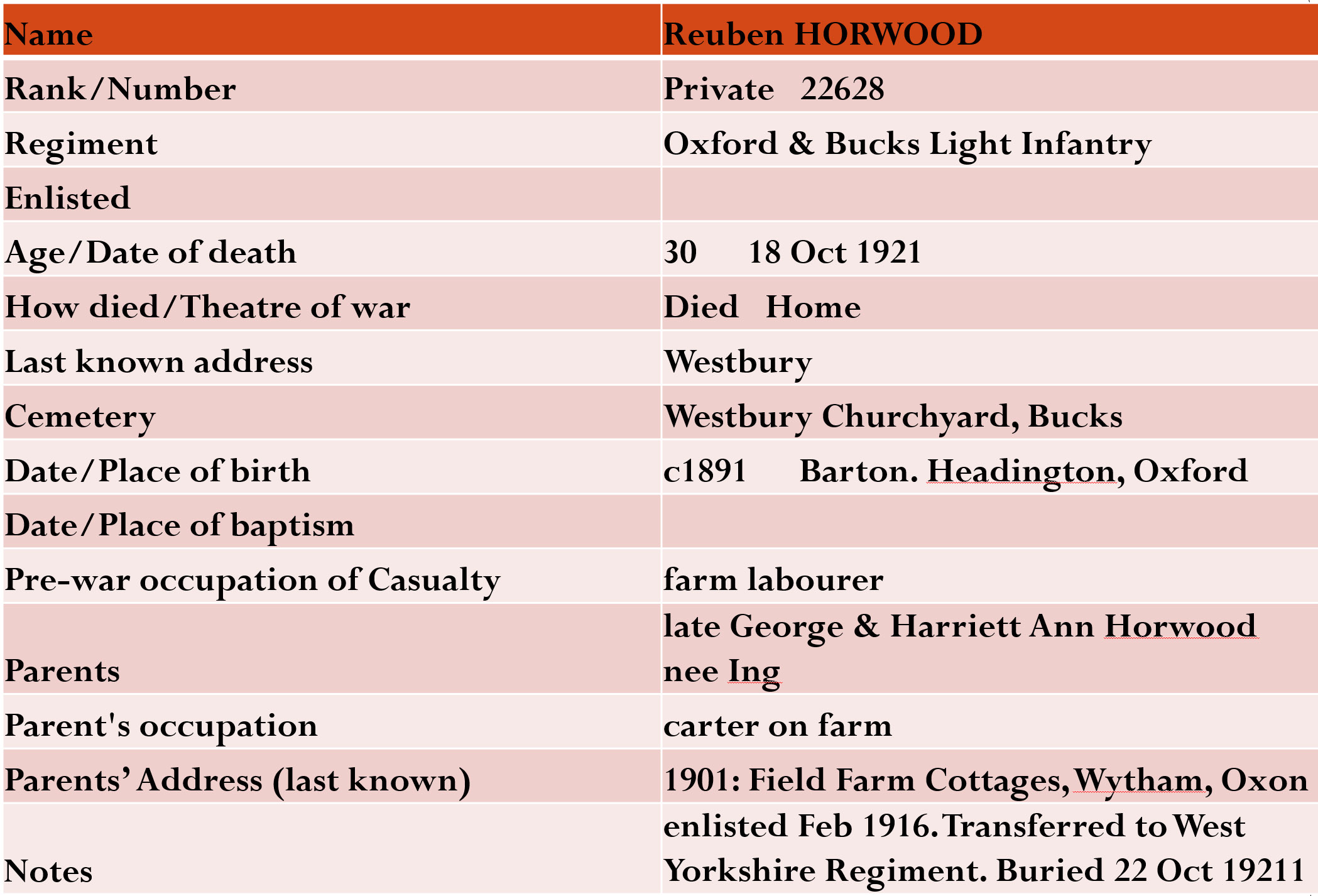
The Reverend Richard and Mary Ussher were particularly struck by tragedy as the parents of six sons and three daughters saw their family decimated by illness, accident and the Great War.
By 1922 all six sons had died
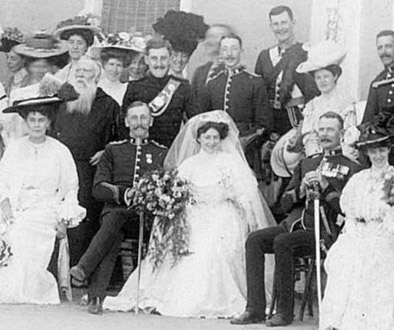
Reverend Richard Ussher
The Reverend Richard who was Vicar of Westbury was particularly struck by these tragedies
He became consumed by his experiences and went on to write a book about the sons of the clergy who gave their lives in the War
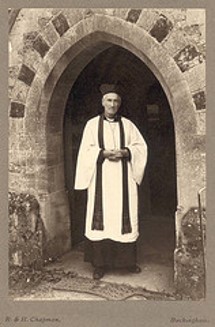
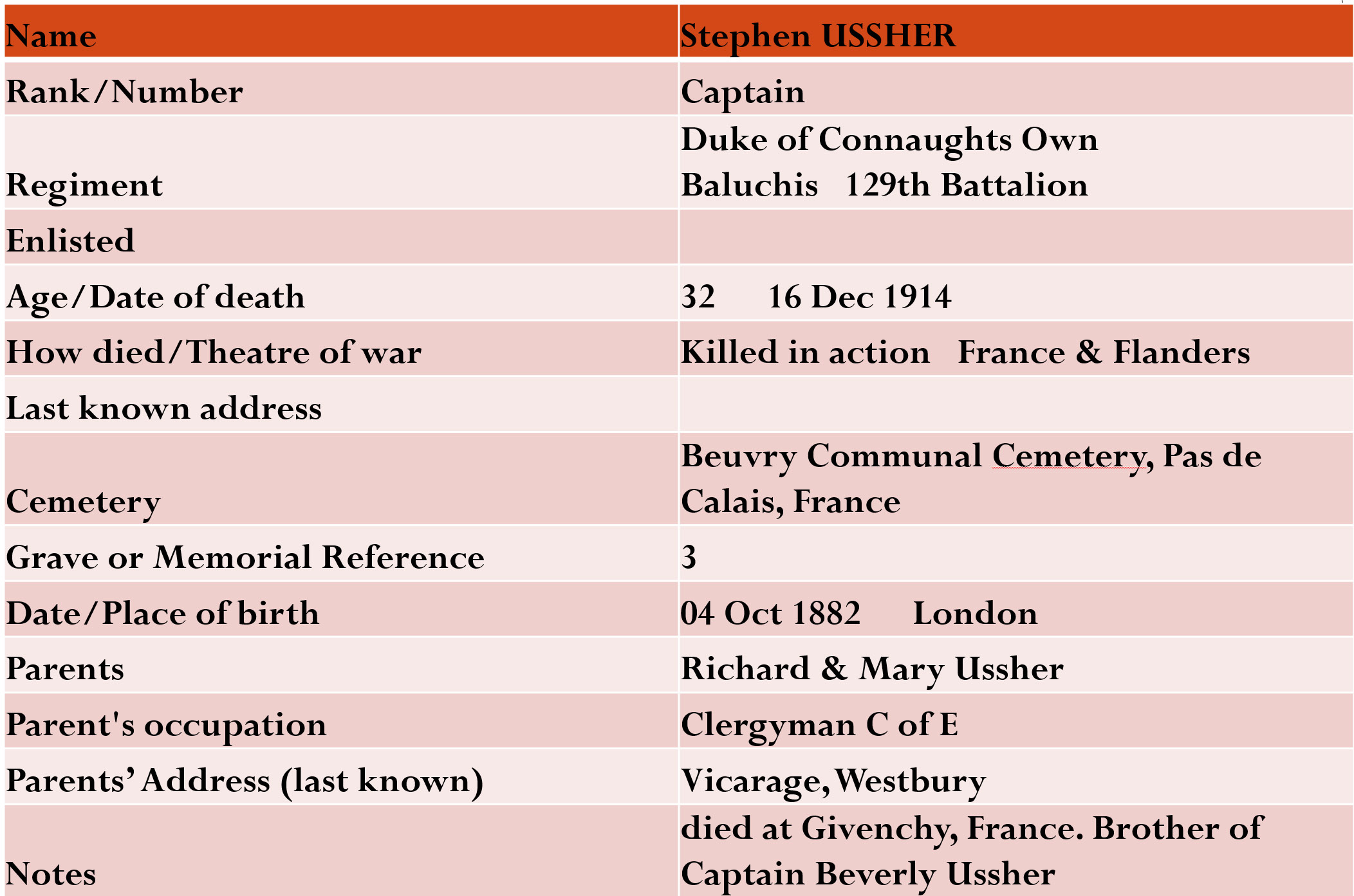
Stephen Ussher was a Pupil at St Edward’s Oxford where he was in the First XI and First XV
He was a career solider in the Indian Army
He was an officer in 129th Duke of Connaught’s Own Baluchi Regiment which recruited its Sepoys from what is now South West Pakistan
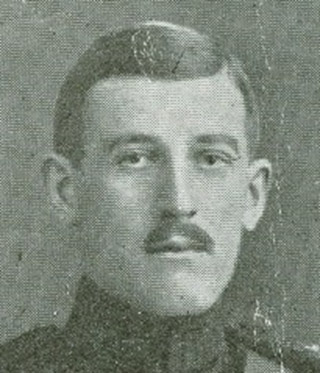
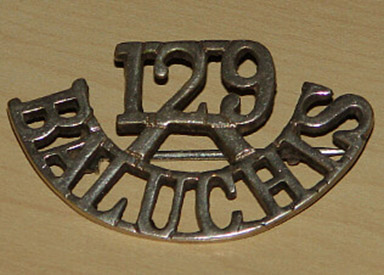
In October 1914, almost immediately after arriving in France, the 129th Baluchis were among 20,000 Indian soldiers sent to the front line
Their job was to help the exhausted and depleted soldiers of the British Expeditionary Force (BEF) to prevent the advancing Germans from capturing the vital ports of Boulogne in France and Nieuwpoort in Belgium
If the Germans could manage to take Boulogne and Nieuwpoort, they would choke off the BEF’S supplies of food and ammunition, and the Allies would lose the war
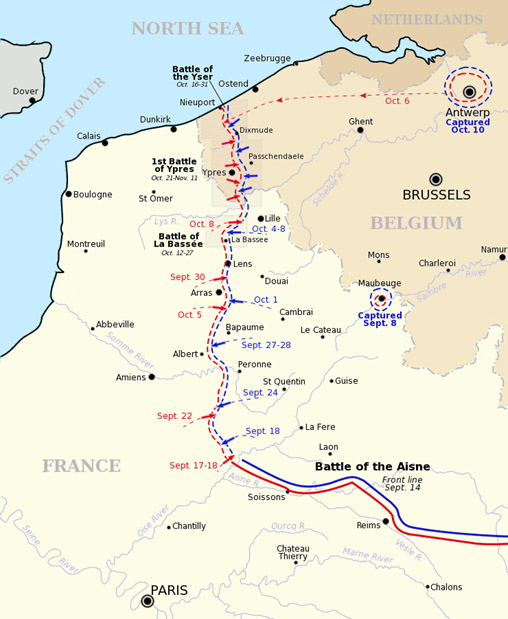
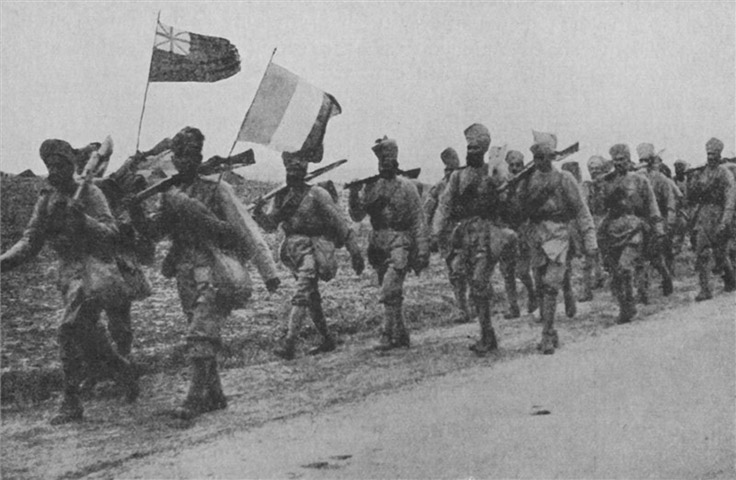
The 129th Baluchis, faced the well-equipped German army in appalling conditions - shallow waterlogged trenches in which to take cover, a lack of hand grenades and barbed wire, and a dire shortage of soldiers to man the defensive line
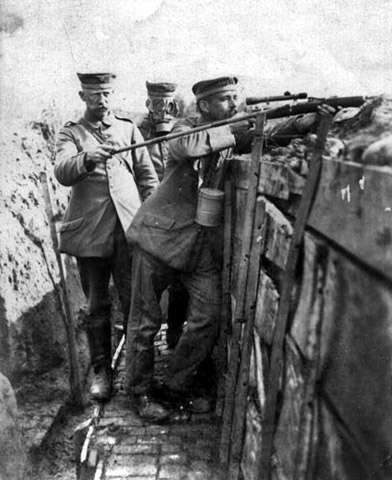
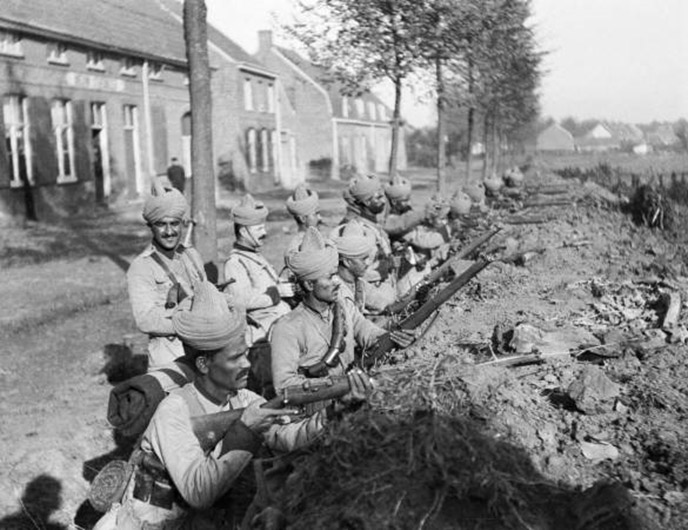
They were also outnumbered five to one. When the Germans attacked on 30 October, most of the Baluchis were pushed back
But Khudadad Khan’s machine-gun team, along with one other, fought on, preventing the Germans from making the final breakthrough
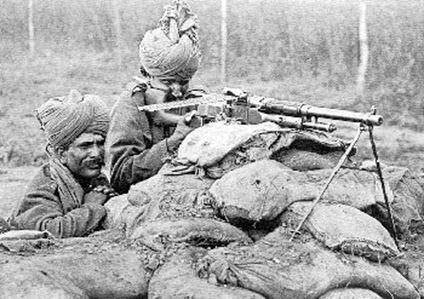
The other gun was disabled by a shell, and eventually Khudadad Khan’s own team was over-run
All the gunners were killed by bullets or bayonets except the badly wounded Khudadad Khan
He pretended to be dead until the attackers had gone on - then, despite his wounds, he managed to make his way back to his regiment
Thanks to his bravery, and that of his fellow Baluchis, the Germans were held up just long enough for Indian and British reinforcements to arrive. They strengthened the line, and prevented the German army from reaching the vital ports
Sepoy Khudadad Khan recovered from his wounds in an English hospital, and three months later was decorated by King George V at Buckingham Palace in London with the Victoria Cross, Britain’s highest award ‘For Valour’. He was the first Indian to receive the award
Khudadad Khan returned to India, and continued to serve in the Indian Army. In 1971 he died at home in Pakistan, aged 84. Several of his descendants now live in England

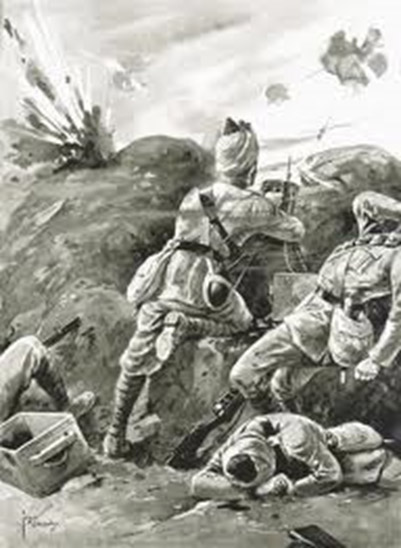
Stephen Ussher was killed in action at Givenchy, 16 Dec. 1914. The 129th Baluchis were ordered to make an attack on the German trenches at Givenchy near La Bassee on the early morning of the 16th
Capt, Ussher was in charge of the Machine-Gun Section of the Regt. The attack at first succeeded, but later the Germans brought up two machine-guns quite close, and by this means prevented any reinforcements coming forward to assist the first attacking party which had gained the Germans’ first line of trenches
Capt. Ussher, seeing what damage the German machine-guns were doing, tried to direct the fire from his guns on to theirs, and while looking over the parapet so that he could direct the fire effectively was hit by a bullet in the centre of his forehead. He died at once without recovering consciousness
His last thought was for the welfare of the others, for as he was shot he called out to a brother officer to "keep down!"
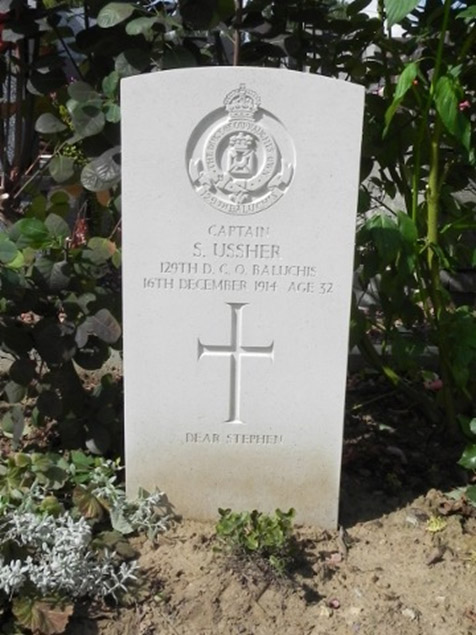
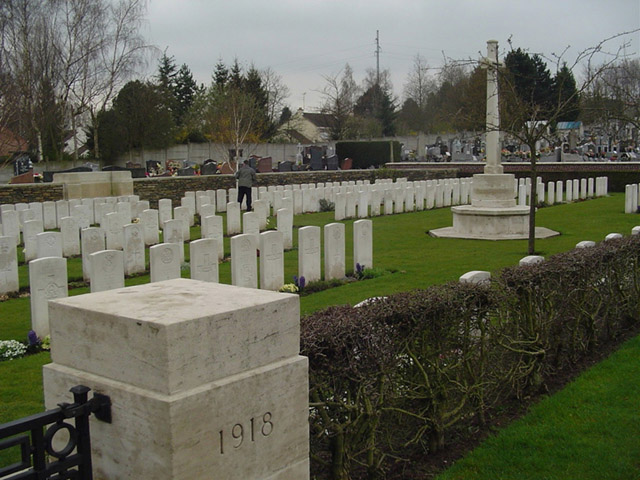
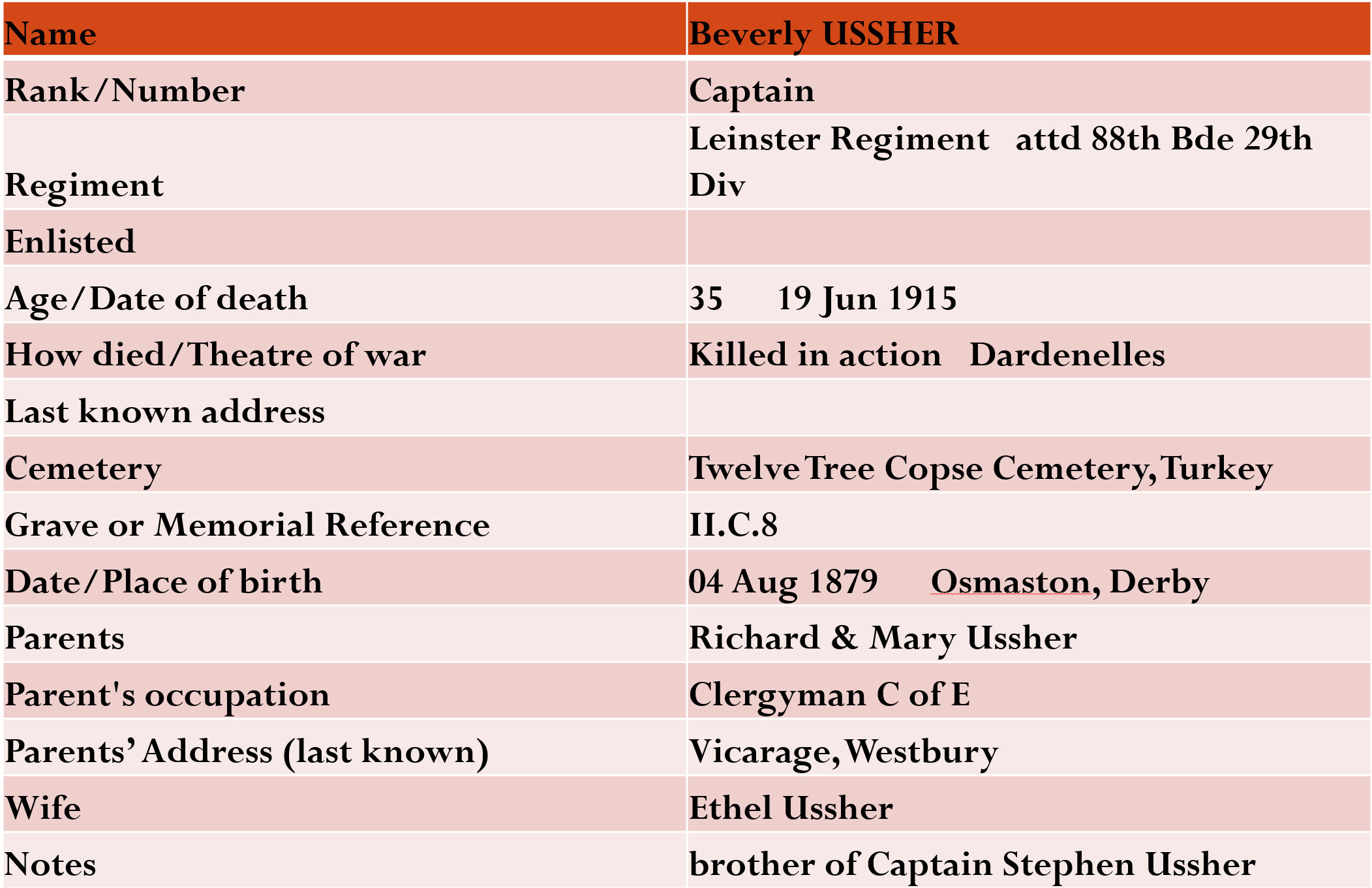
Beverley Ussher was an “exceptional” student; he attended St Edward’s, Oxford between 1891-98. He excelled especially on the sports field he was in the First XI from 1895 to 1898, when he was captain, and in the First XV from 1894 to 1897, when he was captain. He was one of the most brilliant of our cricketers. He headed the batting averages in 1897. Twice he scored for the school a century, and his record of cricket at St. Edward’s ends with the perfectly played 120 which he made in the Jubilee Match
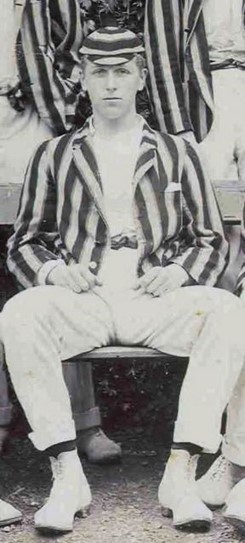
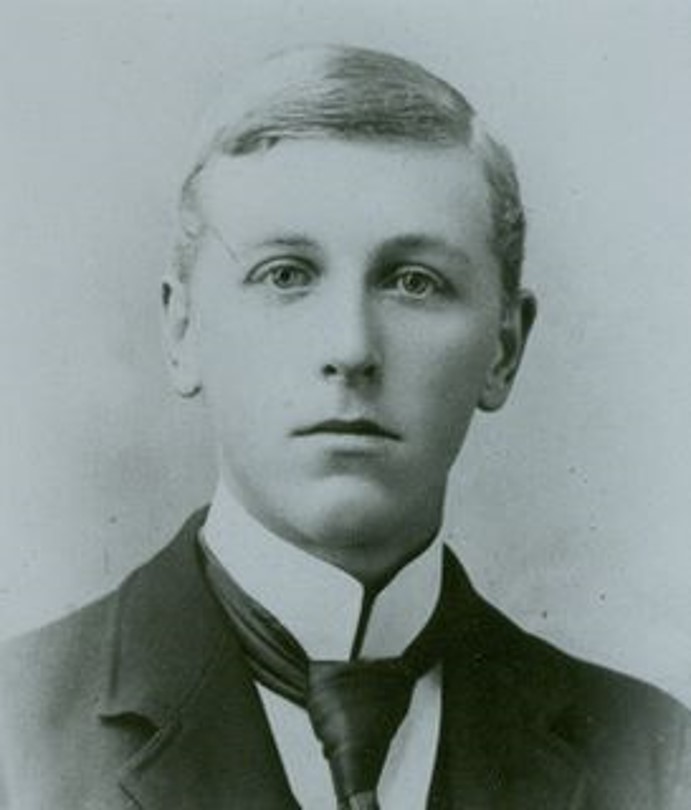
He went on to Wadham College Oxford. He also represented Wadham both at cricket and Rugby
He joined the Leinster Regiment as a regular soldier to fight in the Boer War, India, Ireland and the West Indies.
At the start of the war Beverley Ussheer was an instructor at Sandhurst Military College
But in 1915 he was deployed as a Staff Officer to the Dardanelles and Gallipoli attached to the 88th Brigade in the famous 29th Division; was acting Brigade-Major, and was killed there 11th June, 1915
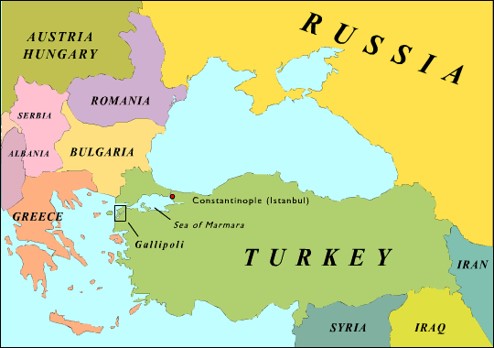
One officer’s account of the death of Beverley Ussher
On the night of 18-19 June, a battallion. of the 42nd Division was attacked and lost two or three trenches
The Turks got in behind our line, and were firing into the backs of the Royal Scots, who were holding the right of the 88th Brigade position
The counter-attack of the 42nd Division did not succeed; so about 2 a.m. we decided to make one ourselves
Capt. Ussher was sent to the support trench of the Worcestershire Regt who were in rear of the Royal Scots
The situation was serious and involved. Communication by telephone with the Royal Scots was interrupted owing to the wire being cut. It was necessary to have clear reports sent back
The Worcestershire Regt. had lost all their regular senior officers, and were, on this night, commanded by a Ceylon Planter. Capt. Ussher was told to see that co-ordinated action was arranged between the Royal Scots and Worcestershire Regt. and to send reports on the situation; but on no account to lead any attempt which was not his work under the circumstances
He took his orderly with him who subsequently told me what occurred
The action to be taken was agreed upon. The Royal Scots charged from their trenches simultaneously with a coy. of the Worcestershire Regt., retook from the Turks the trenches they had seized, followed on and took and held a Turkish trench
There was a close fight with the bayonet which lasted 15 minutes. A German officer was killed. When the Worcestershire Regt. were in the act of jumping out of the trench preparatory to charging, Capt. Ussher was in the trench with Capt. Allen, 142nd Division (Hampshire Regt.)
I understand that he moved, still in the trench, to give room, and as he stood up he was struck in the head by a bullet, and died in a few minutes without becoming conscious
From a letter of Major R.S. Allen, Hants Regiment writing home
"We had attempted to take the Turkish trench in continuation of No. 1 boundary post in our firing line, also another Turkish trench to the west of Krithia Nullah
But the Turks had massed in the Nullah presumably to attack us that very night, and directly we advanced they made a heavy counter attack, driving us back by weight of numbers, and capturing with the bayonet about 50 yards of our original fire trench
I was sent up to organise a counter attack, which was launched by the Lancashire Regiment in the dark but without any success, and I was hurrying to collect men under their own officers to make a second effort when Ussher arrived with a company of the Worcesters, who, he told me, had been sent across to help to get back the lost ground
He and I went forward and pointed out to the Worcesters the trench which they were to take
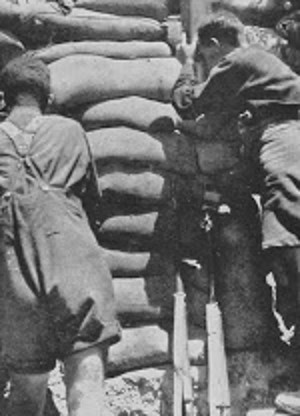
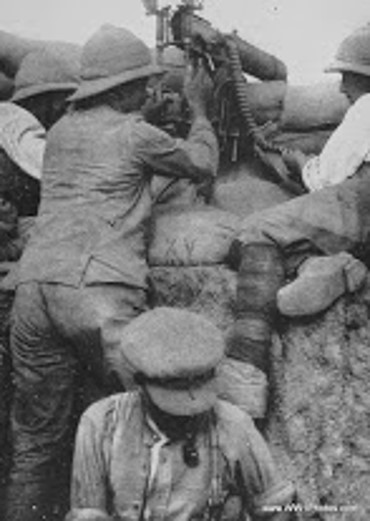
"They moved out over the parapet and lay down in the open. It was just getting night when the commander gave the word to advance
The Turks were keeping up a heavy and accurate fire
The Worcesters dashed forward, but could not at once reach their objective
Ussher and I were there side by side in our firing line and endeavouring to make out what was happening
Suddenly he fell backwards into the trench shot through the head by a rifle bullet, and was killed instantaneously
I was very much distressed, for although we had only met on one or two occasions in the trenches we had become friends in that short time
He was a most charming officer, always so cheery, and everyone who came across him became fond of him at once”
Three Copse Hill where Beverley Ussher is buried
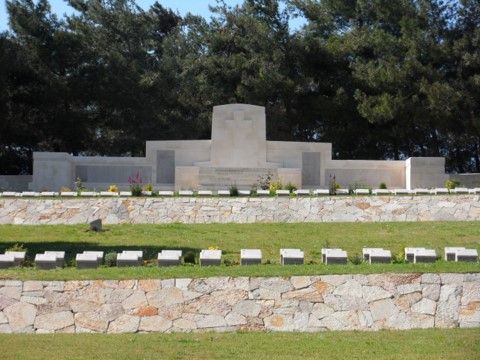
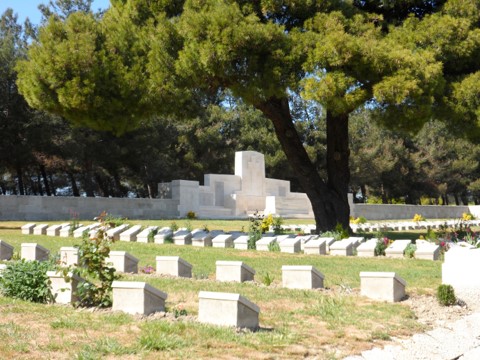
He was born at Ventnor, He was privately educated having only spent 2 terms at St Edward’s
He entered the Royal Navy in 1902
He became a gunnery officer on HMS Hyacinth and served in the Mediterranean and off the coast of East Africa. It was here that he saw heated action.
In July 1915 he was involved in an action off the Refigi Delta which led to the destruction ot the German Cruiser “KÖNIGSBERG”
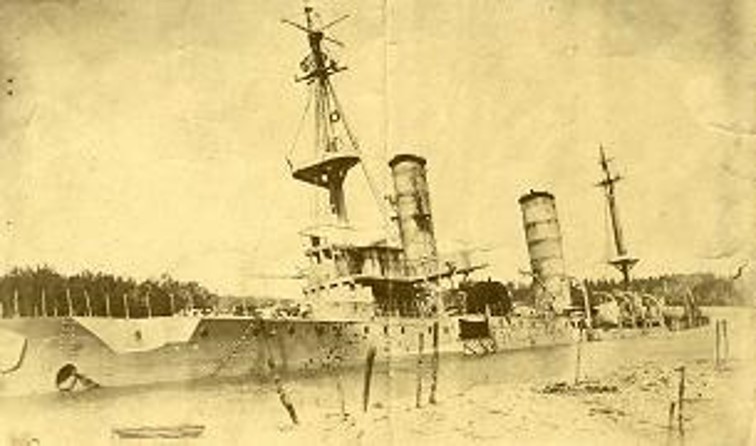
In this action the Richard stood on deck for over six hours under fire while directing the guns of his ship
This shattered his nerves and constitution and he never fully recovered
He was awarded the Distinguished Service Order
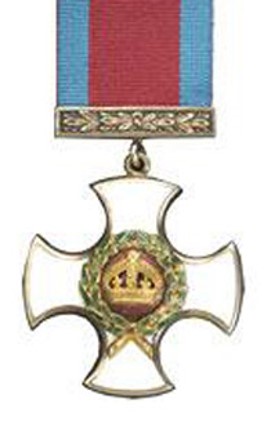
He went to the Alto House Nursing Home in Ventnor Isle of Wight ‘for rest and change’ February 20, 1920
He died on Friday, August 11, 1922
He was buried in Ventnor
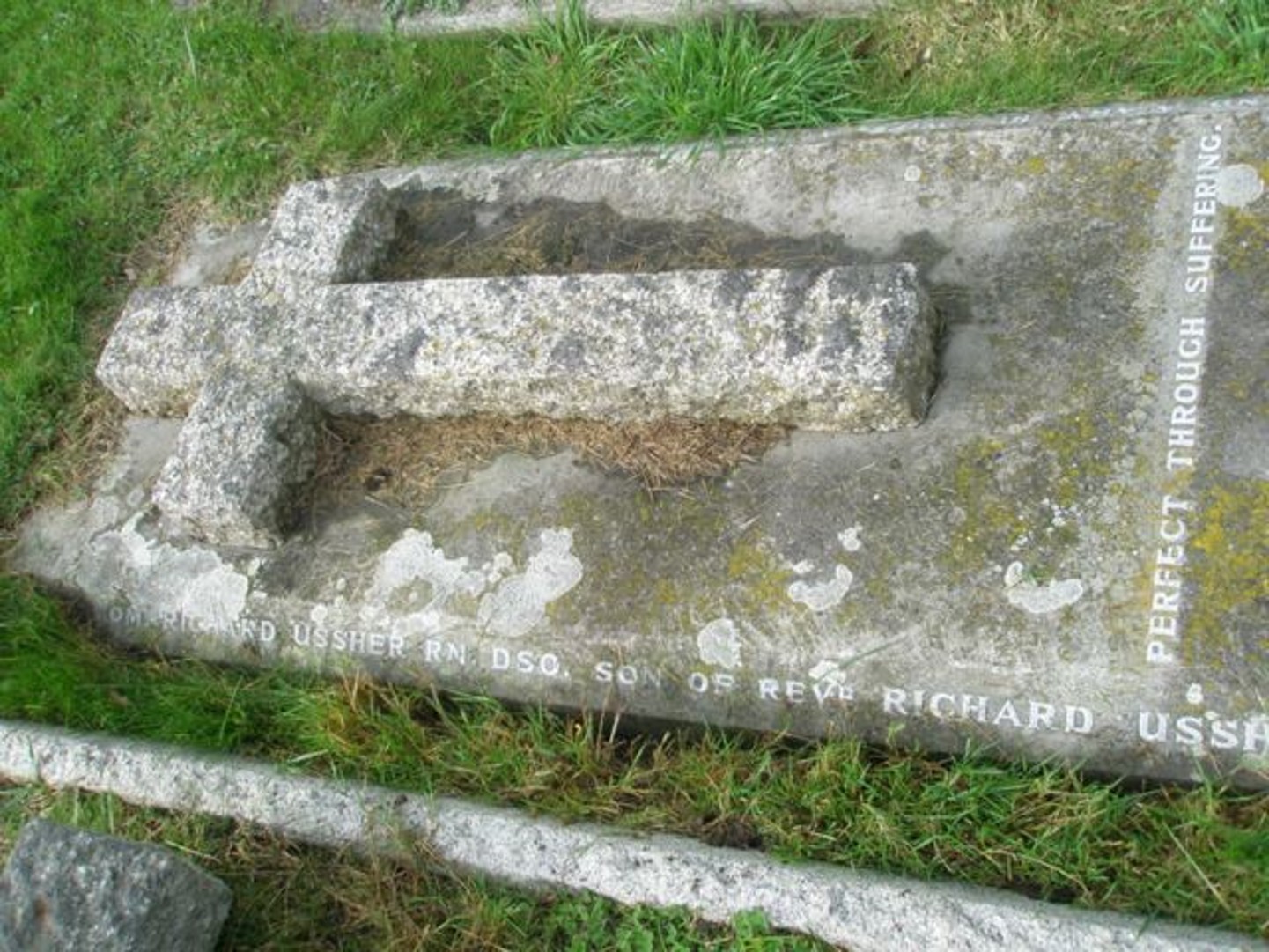
"They shall grow not old as we that are left grow old, age shall not weary them, nor the years condemn, at the going down of the sun and in the morning we shall remember them”
“We shall remember them”
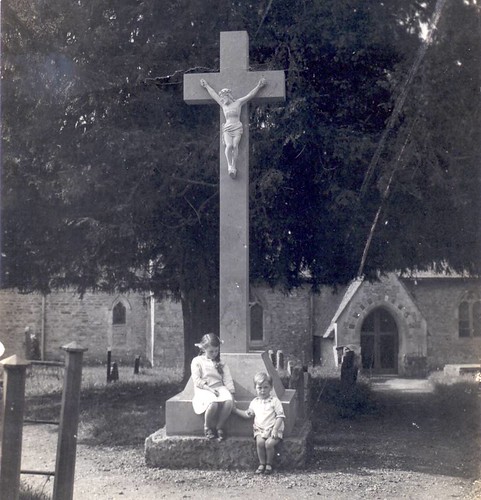
A HUGE thankyou to Michael Sanders former teacher at Beachborough School who researched and shared this information
It costs approximately £20,000 to support the church and churchyard in Westbury each year. If you can help support please click here or on the Parish GIving logo below
